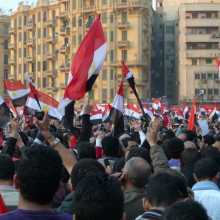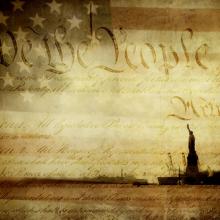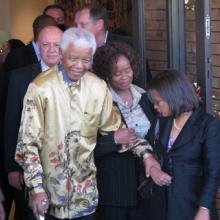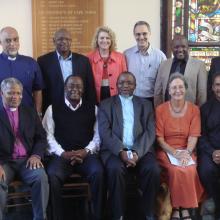Nelson Mandela
In response to the passing of Nelson Mandela, Jim Wallis, President of Sojourners, issued the following statement:
"Nelson Mandela was the most important political leader of the 20th century. While Roosevelt and Churchill helped protect the West and the world from Hitler’s Nazism, Mandela heroically exemplified the historic movement against colonialism and racism that oppressed the global south, depicted so dramatically in South Africa’s apartheid. And from a Christian point of view, Nelson Mandela combined justice and reconciliation like no other political leader of his time, shaped by the spiritual formation of 27 years in prison. Mandela’s life has blessed the world with courage and hope. For me, Nelson Mandela has been an ideal of what leaders can be. Being with him after his release from prison, and being present at his presidential inauguration, gave me a sense of a moral authority that I have never experienced with any other political leader."
Nelson Mandela, the first democratically elected president of South Africa, has been in the hospital for more than two months. Nearly 20 years after his election South Africa remains, despite myriad troubles, a stable, multiracial, and democratic country.
Mohamed Morsi, the first democratically elected president of Egypt after the world-changing protests in Tahrir Square led to the resignation of former president Hosni Mubarak, has been out of office, by way of military coup, for more than one month. He is now being held by the military under house arrest at an undisclosed location, and the mere mention of his name divides the citizens of Egypt. This division has led to the death of more than five hundred Morsi supporters this week alone. In response, members of the Muslim Brotherhood and Morsi supporters have attacked dozens of Coptic Christian Churches.
I SPENT MY first year after college doing voluntary service in Portland, Ore., serving as the hunger action coordinator for a small Catholic organization called the Oregon Center for Peace and Justice. That fall, I joined a group of church anti-hunger activists from around the state in a meeting with our Republican U.S. senator, Mark O. Hatfield. We asked him a number of questions, and urged his continuing support for food- and hunger-related legislation.
When it came my turn, I said, “Senator, how do you reconcile the compromises that you inevitably have to make as a politician with the ideals you hold as a Christian?” In his reply, Sen. Hatfield pointed to the difference between compromises of principle—which he said he would never make—and the tactical compromises necessary to make progress in a pluralistic society. Without the latter, the senator said, politics is nothing but an ideological shouting match.
These days, it’s clear that most far-right Republicans, including those in the party’s leadership, take a slightly different approach to inter-party cooperation than did the late Sen. Hatfield. They seem to see it less as building bridges for the sake of governing a varied society and more as sleeping with the enemy.
There’s probably no better recent example than the issue of health care. The Affordable Care Act, aka Obamacare, is the law of the land—passed by Congress, signed by the president, and ruled constitutional by the Supreme Court. But none of those legal niceties seem to matter to the raw-meat GOP. Their attempts to circumvent or undercut the law range from the inane (such as 67 failed tries—count them: 67—to overturn the ACA by congressional vote) to downright bullying.
What better way to honor Nelson Mandela on his 95th birthday today than to reflect on his concept of Ubuntu? Ubuntu, a word from the Bantu languages of southern Africa — roughly translated “I am because we are” — sums up Mandela’s approach to leadership, incorporating a generous spirit and concern for the wellbeing of one’s community.
Nelson Mandela turned 95-years-old today and in honor of his parity work throughout South Africa, people of all races are joining together and celebrating his legacy in the form of song and offerings. Although Mandela spends this year's birthday under close medical attention, hospital officials believe his condition is improving. The New York Times reports:
On Thursday, hundreds of people gathered outside the Pretoria hospital where Mr. Mandela has been treated for the past 40 days. Officials from the African National Congress brought a birthday cake, while well-wishers added more posters and flowers to the mountain of tributes outside the hospital, ululating and breaking out into freedom songs from the struggle against apartheid.
Read more here.
Mr. Venter’s question is a constant thought during these declining days of Nelson Mandela’s life, especially today — his 95th birthday. I pray daily for my South African daughter Eliza, husband Jonathan, and their four sons Noah, Aidan, Luke, and Sam, along with the many dear South African friends gathered over the past 30 years. Will they live the on-going dream or in an emerging nightmare?
In 1994, during Bill Clinton’s presidency, I had the honor of meeting President Nelson Mandela in a most unexpected way — just two months after his April inauguration as the first democratically-elected President of South Africa.
What do I love about America? I love the land, one of the most spectacularly beautiful countries in the world (and I’ve visited many of them). I love walking our long stretches of beaches, hiking our majestic mountains, seeing the desert skies, walking beside the rivers, sailing along the coasts, and visiting hundreds of lakes in my home state of Michigan, where I camped as a kid. I even love some of our big cities! “O beautiful for spacious skies, for amber waves of grain, for purple mountain majesties, above the fruited plains.” I love our many diverse cultures, including their music, their food, their art, their sports, and their particular stories and histories.
I especially love our best national values: freedom, opportunity, community, justice, human rights, and equality under the law for all of our citizens of every race, creed, culture, and gender, not just for the rich and powerful. In particular, I love our tradition and history of democracy, its steady expansion here, and how it has inspired the same all over the world. We take legitimate pride in seeing how our founding documents have been the models for many new nations.
Will native son and national hero Nelson Mandela survive his latest bout with illness? That is the single question dominating headlines, speeches, twitter, and conversation throughout South Africa.
It’s an unusual situation in a country where death is an off-limits topic due to local culture. But as locals brace themselves, anxious, and hopeful, they remain stoic and protective, insisting on Mandela’s privacy as he battles a lung infection. And they say he has a right to be left alone.
“This is a man who gave so much of himself to this country,” said Roseline Wilson, 30, an insurance company representative in Johannesburg. “He must rest. He has suffered too much in his old age.”
Having achieved our freedom we can fall into the trap of washing our hands of difficulties that others face. We would be less human if we do so…we know too well that our freedom is incomplete without the freedom of the Palestinians.
- President Nelson Mandela- December 1997
There is visceral identification by South Africans with the suffering of the Palestinians.
Newspapers and speakers at South Africa Human Rights Day/U.N. International Day for the Elimination of Racial Discrimination focused on the liberation of the oppressed and the importance of a mobilized civil society to stand with the marginalized. The events commemorate the nonviolent protest against the racial passbooks, March 21, 1960. The day ended tragically with the Sharpeville massacre, which left 69 people dead and 180 injured. Nelson Mandela burned his discriminatory passbook a week later and the long march for freedom and dignity began in earnest. Even when it is still a journey in progress of real equality and democracy for all, there is an intentionality expressed best by Mandela.
In Mandela: An Audio History, the voices of activists, artists, and ordinary citizens unite to tell the powerful narrative of overcoming apartheid through strength and solidarity in South Africa. In this five-part audio documentary, hosted by Desmond Tutu, the weaving of personal interviews, newsreels, and found sounds from Mandela and those around him (both for and against) are highlighted to showcase the watershed story of a 50-year struggle.
CLICK HERE TO LISTEN TO THE FULL SERIES OF AUDIO DOCUMENTARIES
Take a listen to Part One: 1944 –1960
Back in 2005, Africa was a recurring theme of U2's worldwide Vertigo tour, where Bono’s campaigning for debt relief, trade justice and immediate intervention in the AIDS pandemic — each fueled by his following of Jesus — met in his music in indelibly powerful collision of faith, justice, and art.
When Bono and his bandmates played “Where The Streets Have No Name,” the most amazing mass of colors dropped from the rafters as millions of Willie Williams-designed, light bulbs descended from the rafters to form stage’s back drop and a modern-mosaic high-tech screen. Then came the flags of each African nation in the most moving light show I’ve ever seen.
During the razzle-dazzle on stage, Bono made his claim,
“From the swamp lands of Louisiana to the high hills of Kilimanjaro, from the bridge at Selma to the mouth of the Nile…AFRICA…AFRICA…AFRICA…the
journey of equality moves on, moves on…AFRICA…from town centers to townships…sacred ground, proving ground…”
The link between the Martin Luther King Jr. (the Doctor of the Deep South of America’s inequality) to Desmond Tutu and Nelson Mandela (the Archbishop and President of Africa’s inequality) was particularly potent art.
In 1985 the South African writers of the Kairos Document declared the Dutch Reformed Church’s “state church” theology to be heretical because of its justification of apartheid. In the months following, Desmond Tutu and many other anti-apartheid leaders risked their lives for change.
On the 2012 Centenary Celebrations of the African National Congress, 21 years after Nelson Mandela’s release from prison, the Kairos Southern Africa theologians have released, “A Word to the ANC in These Times.” The document boldly calls attention to the “certain contradictions [that] continue to militate against … fully achieving the dream that the injustice … meted out to black South Africans by the colonizers would come to an end.”
The document raised other critical issues, such as diminishing diversity, party factionalism and inappropriate security measures. The authors clearly declared, “A house divided against itself cannot stand.” (Matthew12:25)
The Kairos steering committee met with the ANC executive in a closed meeting February 8. The discussion focused on poor standards of education, unsustainability of an “opulent ‘American dream’ lifestyle, respecting the Constitution of the Republic, and closing the gap between the richest and poorest.
[Editors' Note: Former state trooper James Bonard Fowler plead guilty this week to a misdemeanor manslaughter charge in the 1965 shooting of Jimmie Lee Jackson in Alabama.
[Editor's Note: In anticipation of the anniversary of the March on Washington on August 28, 1963, God's Politics will feature a series of posts on the legacy of Dr. Martin Luther King.









